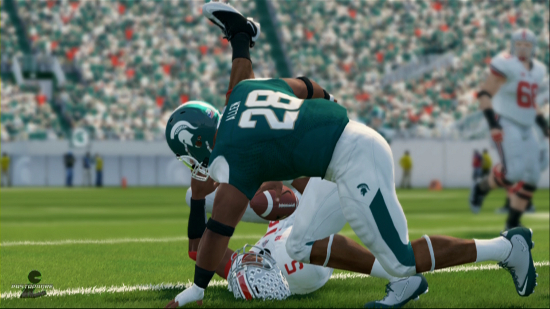EA Sports Hopes To Make College Football and Basketball Games in the Future

In testimony earlier this week in the Ed O’Bannon case vs the NCAA, an Electronic Arts representative expressed the desire the company has to develop college-based video games in the future. Joel Linzner, EVP of Business & Legal, stated EA would be “very interested in acquiring the rights” of players to use in the games.
Of course this would require the NCAA to remove most if not all restrictions on the “amateur” status of athletes which is what the class action suit is attempting to force. The testimony was highlighted by the plaintiffs to demonstrate that there is a legitimate marketplace for the names and likenesses of college athletes – which everyone knows is true but the NCAA contests.
At this point it appears likely the O’Bannon class will win, with some experts noting that it seems the NCAA is building arguments for appeals more so than to win at this stage.
The appeals process could stretch on for a number of years so regardless of the upcoming outcome – even if it opens up the possibility of college games returning – it won’t be soon and there is no guarantee it will make fiscal sense to develop and publish them.
What would the rights to each player be worth? Would they be negotiating on their own, opening up the possibility of some asking for excessively lucrative deals or sitting out of the game, or would there be a union similar to the NFL and other professional sports? In the end it will always come down to whether the game can be produced and generate a profit when considering potential increased sales from spending that money to acquire player rights.
Earlier/Summary Below
The player likeness lawsuit against the NCAA, CLC, and Electronic Arts is the culmination of two high profile filings that were combined as led by Sam Keller and Ed O’Bannon (and O’Bannon now heads it up). It alleges improper use of player likeness through various forms of merchandise and media including video games in which the parties in question conspired to avoid paying players for their rights. Some interesting details and claims regarding the case at hand were revealed when EA was reentered as a defendant after initially being dismissed.
EA originally won a previous case regarding player likeness with the courts ruling video games are artistic works rather than commercial speech and therefore protected by the First Amendment. The Supreme Court in 2011 established forms of media, producing expressive works of art, are not subject to judgments based on incorporating someone’s name or likeness. That dismissed case however, involving Ryan Hart, has resurfaced after an appeals court reversed a decision based on that argument.
Recent uncovered emails have shown that NCAA representatives were well aware that players in games were based off real-life players. At one point the NCAA and EA had nearly reached an agreement to have actual player names included in the products. The EA Locker / Roster Share feature was a fallback option. With momentum clearly on the plantiffs’ side NCAA reps have begun to publicly express concern over the future of collegiate sports. A former EA Sports producer admitted players in NCAA games were based off real athletes.
The discovery of Tim Tebow’s name being in NCAA Football 10 could throw another wrench into EA’s series of arguments. Depositions from former Alabama wide receiver Tyrone Prothro and UConn basketball guard Tate George support the defendant’s reasoning for denying class action certification. The class action hearing resulted in the judge heavily questioning the legitimacy of a potential class and insisting a current athlete be involved. The judge required current athletes be added as plaintiffs for that party to have representation if the case is certified as class action. Six current college football players were added as plaintiffs in mid-July.
EA is now arguing to be dismissed as a defendant in the suit. A major defense for the company however was recently struck down by an appeals court.
This consolidated case in California if certified as class action would go to trial – barring a settlement – and ultimately be the determining factor of how the NCAA proceeds in the future handling broadcasting rights, merchandising, and video games. Should a negative result come down, which one analyst has pegged as being a potential loss of $1 billion for EA, it would likely not just end the NCAA Football series but also with it any realistic possibility of college sports games being made in the future. The trial now is slated to begin June 9, 2014. Appeals following a decision could extend the fight through 2020.
[SEMI-RESOLUTION] EA and the CLC have settled the lawsuit. EA Sports will no longer produce a college football game. Getting out of the lawsuit only cost EA and CLC $40 million. The NCAA also settled their part in the video game aspect of the lawsuit for $20 million.
